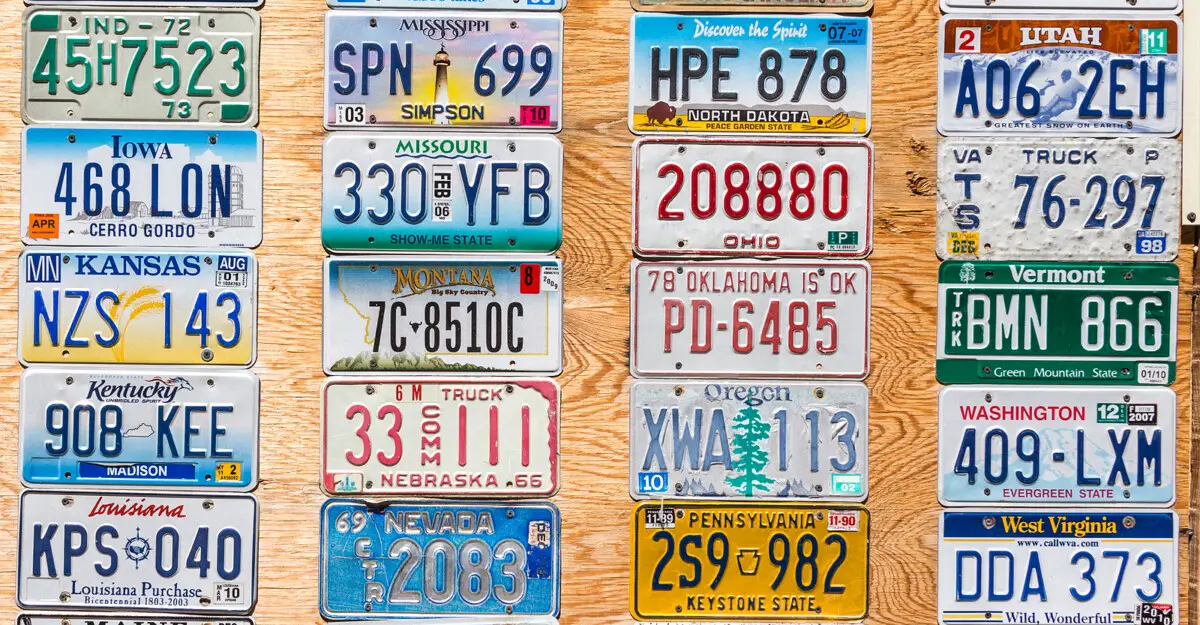Table of Contents
If you live in the United States and frequently travel across state lines, you’ve likely not given much thought to whether or not your vehicle is legally allowed to drive in a state other than the one you reside in. This is because, in general, U.S. states have “registration reciprocity” agreements with other which basically mean that if your vehicle is legally registered to drive on public roads in your home state, then the other states will accept and honor that registration too.
Many people don’t know, however, that this concept of vehicle registration reciprocity can also be applied to a UTV or ATV. In general, if a UTV or ATV is legally registered in one state, than you can often drive it on the roadways in another state via the registration reciprocity agreement… except if the state you are driving in has specific terms or clauses that disallow this for the UTV, ATV or more generically classified as OHVs (off-highway vehicles) or ORVs (off-road vehicles). To get a real clear picture of the legality of this in each state, you’ve got to check the laws for that specific state.
What is Registration Reciprocity?
In simple terms, Registration Reciprocity means a vehicle legally registered in one state can be driven in other states without undergoing major changes to their parts or registration status. These agreements are made between states to streamline the movement of vehicles across state lines and reduce the burden on vehicle owners by recognizing and accepting the registration and licensing requirements of other states thereby eliminating the need for repetitive registrations and their associated expenses.
Anytime you cross state lines in your automobile, you are essentially leveraging this concept. Otherwise you’d have to separately register your vehicle in each state you plan in which you plan to drive it. What a headache!
Registration reciprocity encompasses various types of motor vehicles, including passenger vehicles, commercial vehicles, motorcycles, trailers, and off-highway vehicles (yes, ATVs, UTVs, dirtbikes, etc.). However, it is important to note that not all states have identical agreements or reciprocity conditions.
Some states have full reciprocity, meaning they accept any vehicle registered in another state. Meanwhile others have partial reciprocity, which may involve specific vehicle types or impose certain restrictions (such as excluding OHVs from the reciprocity). Additionally, some states have no reciprocity at all, requiring registration within their borders if the vehicle is driven or parked there for an extended period.
How to Find Out if Your Vehicle Qualifies for Registration Reciprocity?
To determine whether your vehicle qualifies for registration reciprocity, it is advisable to consult the Department of Motor Vehicles (DMV) of the state you plan to visit or are currently in.
Several factors can influence your vehicle’s eligibility for registration reciprocity:
- Vehicle Type: Different vehicle categories, such as passenger vehicles, commercial vehicles, motorcycles, and trailers, may have distinct reciprocity conditions.
- Registration Type: Regular, temporary, or special registrations might have varying reciprocity considerations.
- License Plate Type: Standard, personalized, or specialty license plates could have different reciprocity implications.
- Duration of Stay: The length of time you spend in a state, such as less than 30 days or more than 90 days, can affect reciprocity.
- Purpose of Travel: Whether you are visiting for tourism, business, education, or other reasons can influence reciprocity requirements.
- Residency Status: Your residency status as a vehicle owner (resident, non-resident, foreigner) may impact eligibility for reciprocity.
How Does Registration Reciprocity Apply to Off-Highway Vehicles Such as UTVs?
Registration reciprocity agreements also extend to off-highway vehicles (OHVs) in many states. Off-highway vehicles (OHVs) include various recreational vehicles designed for unpaved roads or trails, such as ATVs, UTVs, dirt bikes, and snowmobiles. While the specifics may vary between states, the general principle of registration reciprocity applies to these vehicles as well.
OHV owners who have legally registered and operate their vehicles in one state can often use them in other participating states without the need for separate registrations or permits. This simplifies the process for OHV enthusiasts who frequently travel across state lines to explore different off-road terrains.
Additionally, some OHVs can be registered as street-legal vehicles if they meet specific requirements and modifications. Even so, it’s important to note that not all states recognize or permit OHVs to be driven on public roads or highways. If you own an OHV registered as street-legal in your home state and intend to drive it in another state, it is crucial to verify whether that state accepts your registration and license plate. You should also check if any particular rules or restrictions regarding OHVs on public roads or highways apply in that state.
For example, states like Arizona and Utah have relatively lenient laws for OHVs, allowing them to be driven on most public roads with minimal modifications. On the other hand, states such as California and New York have strict laws and prohibit OHVs from being driven on any public roads unless they fully comply with federal safety and emission standards.
Factors to Consider for Registration Reciprocity to OHVs
Generally, when it comes to registration reciprocity to OHVs, several factors come into play:
- Eligibility: Each state may have specific criteria regarding the types of OHVs eligible for registration reciprocity. While some states may accept reciprocity for all types of OHVs, others may limit it to specific vehicle classifications like ATVs or exclude certain vehicles altogether.
- Safety and Equipment Requirements: The state where you plan to use your OHV may require compliance with certain safety and equipment standards. These can include features like headlights, taillights, brake lights, turn signals, mirrors, and spark arrestors. It’s crucial to ensure your OHV meets the requirements of the state you are visiting.
- Duration: Reciprocity agreements may have limitations on the duration for which they are valid. Some states may only recognize reciprocity for a temporary period, such as a short-term visit or a specified number of days. It’s important to be aware of the specific duration allowed by the state.
- Proof of Registration: When using your OHV in a state that recognizes reciprocity, you will likely need to carry proof of registration from your home state. This documentation may include a valid registration certificate or a similar form of proof. Having these documents readily available will help demonstrate compliance with the reciprocity agreement.
Can you use Registration Reciprocity to drive your UTV in another state?
Registration reciprocity of vehicles in the United States is a multifaceted and variable subject, heavily influenced by numerous factors and conditions, particularly as it applies to offroad vehicles. However, in many states (but not all) it is possible to drive your UTV or ATV on the roadways as “street legal” if indeed the vehicle is legally registered as street legal in another state. For more information, consult our write-ups about the UTV laws in each state.
One method that some riders use is to register their UVT as street legal in a state that allows UTVs on the public roadways, and then use that registration to allow them to drive the UTV in other states as well. This can work even in some states where its not legal to register a UTV as street legal, so long as that state does not exclude the UTV registration from reciprocity or otherwise disallow the vehicle in the state laws.


